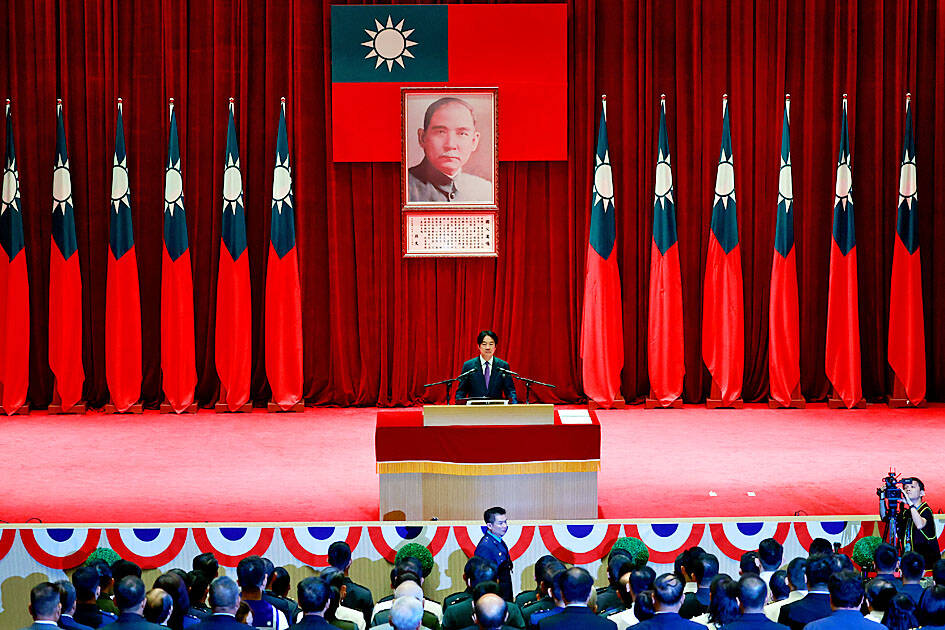President William Lai (賴清德) yesterday said that aggression would inevitably fail, pointing — on the day before a mass military parade in Beijing — to the lessons from World War II and key victories Taiwan claims against Chinese forces in 1958.
Taiwan has over the past five years repeatedly complained about heightened Chinese military activity including war games around the nation as Beijing steps up pressure to enforce territorial claims that Taipei rejects.
Chinese President Xi Jinping (習近平), flanked by Russian President Vladimir Putin and North Korean leader Kim Jong-un, are to oversee a military parade in Beijing today to mark the 80th anniversary of the end of World War II.

Photo: Ritchie B. Tongo, EPA
Speaking to a gathering of military personnel, including several high-ranking officers, at the Ministry of National Defense, Lai said that yesterday marked the 67th anniversary of a 1958 naval battle Taiwan celebrates as a victory that was part of the Aug. 23 Chinese attack on Kinmen, better known internationally as the Second Taiwan Strait Crisis.
Taiwan’s victories then show that true peace stems from a resolve to unite against aggression, he said.
“We all know that the current security environment is more severe than ever before. In recent years, the Chinese communists have persistently conducted high-intensity activities with military aircraft and vessels around the Taiwan Strait,” Lai said.
China’s actions are “not only a threat to Taiwan’s democracy and freedom, but also a challenge to the democratic world,” he said. “From the victory in World War II to the glorious achievements of the September 2nd naval battle and the August 23rd artillery exchange, the most valuable lesson remains: Unity ensures victory, while aggression inevitably fails.”
Lai highlighted the importance of social solidarity and preparedness, both in military and societal terms, adding that only by cultivating these qualities can “we truly safeguard our nation’s sovereignty and democracy.”
He outlined his administration’s measures over the past year to improve the salaries and benefits of military personnel, while boosting defense spending and investments, as part of broader efforts to strengthen military capabilities.
He also thanked military officers, particularly those tasked with guarding Taiwan amid Chinese incursions and sorties near the nation’s airspace and territorial waters, for “shouldering the responsibility of defending the survival and development of the Republic of China (Taiwan).”
Taiwan and China have both been engaged in an increasingly tense exchange of accusations about the World War II anniversary and its broader historical meaning.
Taiwan has told its people not to attend Beijing’s parade, to China’s anger.
The Chinese Nationalist Party (KMT) and the Republic of China government it ran fled to Taiwan in 1949 after losing a civil war with the Chinese Communist Party of leader Mao Zedong (毛澤東).
The two had an uneasy alliance against Japan in World War II and the Japanese invasion of China that preceded that, although much of the fighting was done by the KMT, historians generally agree.

People can preregister to receive their NT$10,000 (US$325) cash distributed from the central government on Nov. 5 after President William Lai (賴清德) yesterday signed the Special Budget for Strengthening Economic, Social and National Security Resilience, the Executive Yuan told a news conference last night. The special budget, passed by the Legislative Yuan on Friday last week with a cash handout budget of NT$236 billion, was officially submitted to the Executive Yuan and the Presidential Office yesterday afternoon. People can register through the official Web site at https://10000.gov.tw to have the funds deposited into their bank accounts, withdraw the funds at automated teller

PEACE AND STABILITY: Maintaining the cross-strait ‘status quo’ has long been the government’s position, the Ministry of Foreign Affairs said Taiwan is committed to maintaining the cross-strait “status quo” and seeks no escalation of tensions, the Ministry of Foreign Affairs (MOFA) said yesterday, rebutting a Time magazine opinion piece that described President William Lai (賴清德) as a “reckless leader.” The article, titled “The US Must Beware of Taiwan’s Reckless Leader,” was written by Lyle Goldstein, director of the Asia Program at the Washington-based Defense Priorities think tank. Goldstein wrote that Taiwan is “the world’s most dangerous flashpoint” amid ongoing conflicts in the Middle East and Russia’s invasion of Ukraine. He said that the situation in the Taiwan Strait has become less stable

CONCESSION: A Shin Kong official said that the firm was ‘willing to contribute’ to the nation, as the move would enable Nvidia Crop to build its headquarters in Taiwan Shin Kong Life Insurance Co (新光人壽) yesterday said it would relinquish land-use rights, or known as surface rights, for two plots in Taipei’s Beitou District (北投), paving the way for Nvidia Corp to expand its office footprint in Taiwan. The insurer said it made the decision “in the interest of the nation’s greater good” and would not seek compensation from taxpayers for potential future losses, calling the move a gesture to resolve a months-long impasse among the insurer, the Taipei City Government and the US chip giant. “The decision was made on the condition that the Taipei City Government reimburses the related

FRESH LOOK: A committee would gather expert and public input on the themes and visual motifs that would appear on the notes, the central bank governor said The central bank has launched a comprehensive redesign of New Taiwan dollar banknotes to enhance anti-counterfeiting measures, improve accessibility and align the bills with global sustainability standards, Governor Yang Chin-long (楊金龍) told a meeting of the legislature’s Finance Committee yesterday. The overhaul would affect all five denominations — NT$100, NT$200, NT$500, NT$1,000 and NT$2,000 notes — but not coins, Yang said. It would be the first major update to the banknotes in 24 years, as the current series, introduced in 2001, has remained in circulation amid rapid advances in printing technology and security standards. “Updating the notes is essential to safeguard the integrity